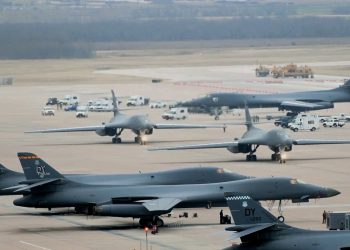Agence France-Presse, Norwegian and British fighter jets scrambled Sept. 6 to intercept eight Russian bombers over the north Atlantic, the latest in a series of such incidents, according to Norway’s military command,
Eight Russian Tupolev-95s were detected in international airspace over the Barents Sea on Sept. 6, said Wing Commander Jon Inge Oegland, a spokesman for Norway’s general staff in Stavanger.
“Following the established routines, we sent up two F-16s to mark out Norwegian air space. The Russian planes were close to Norwegian air space, but they did not enter,” he said.
The British Royal Air Force also scrambled four Tornado jets to intercept the Russian fighters.
Sky News said the Russian aircraft did a U-turn when approached by the fighters.
“Russia had announced an aerial military exercise in the coming days,” Oegland said. “These latest flights are certainly linked to that.”
Russia’s air force announced Sept. 3 that 12 of its bombers would be taking part in strategic exercises in the region, but they were meant to run earlier this week.
Russia’s TU-95s are long-range strategic bombers that date back to the Soviet era. They can be equipped with a nuclear payload.
Russian President Vladimir Putin announced the resumption of long-range flights in international air space while he attended military exercises Aug. 17.
Even in the weeks before his statement, Britain and Norway had to scramble jets to intercept Russian planes near their airspace. Russian bombers had also been making increasingly frequent flights near U.S. territory.
Such flights were standard during the Cold War standoff with the U.S. and its western European allies but were abandoned in 1992 amid financial difficulties that followed the Soviet collapse.
Russia’s head of strategic aviation Gen. Pavel Androsov said last week that the aircraft were not carrying nuclear weapons and that the main aim of the flight was to improve training for pilots.
But the flights come against a background of increasing tension between Russia and some western powers. Some observers also see it as a sign of renewed self-confidence on the international stage.
Russia has objected strongly to U.S. plans to place anti-missile defense facilities in the Czech Republic and Poland, countries that were ruled from Moscow during the Cold War but are now members of NATO.
Russian and Chinese special forces began a joint counterterrorism exercise Sept. 4 dubbed “Friendship 2007” in Moscow, underlining the two neighbors’ growing security ties.








